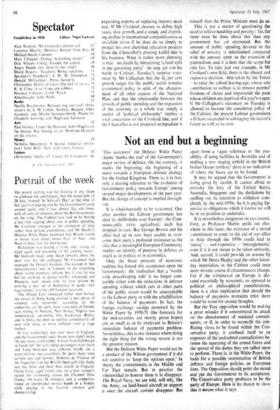Not an end but a beginning 'This statement' the Defence
White Paper claims `marks the end' of the Government's major review of defence. On the contrary, it marks the beginning; the beginning of a move towards a European defence strategy for the United Kingdom. There is, it is true, only a passing reference to 'the evolution of Government policy towards Europe' among several major developments of the past year. But the change of concept is implied through- out.
It is wholeheartedly to be welcomed. One after another the Labour government has shed its shibboleths over Europe: the Com- monwealth, EFTA, agriculture; each has -dropped in turn. But George Brown and his allies had up to now been unable to over- come their party's profound resistance.to the idea that a meaningful European_ Community implies an identity of purpose in defence as much as in politics or in economics.
Only the brute pressure of economic realities has forced this acceptance upon the Government : the realisation that a .`world- ‘v ide peacekeeping role' is no longer com- patible either with the reductions in defence spending without which cuts in other parts of the public sector would be unacceptable to the Labour party or with the rehabilitation of the balance of payments. In fact, the foreign exchange savings promised by the White Paper by 1970-71 (the forecasts for the mid-seventies are merely pious hopes) are so small as to be irrelevant to Britain's immediate balance of payments problem. Nevertheless, this is one instance where doing the right thing for the wrong reason is not the greatest treason.
But the Defence White Paper would not be a product of the Wilson government if it did not contrive to 'keep the options open.' In theory the commitments in the Middle and Far East remain. But in practice the wherewithal to honour them is to disappear. The Royal Navy, we are told, will rely,, llke the Army,. on land-based aircraft to support it once the aircraft • carriers disappear: But apart from a vague reference to 'the pos- sibility' of using facilities in Australia and of making a new staging airfield in the British Indian Ocean territory' there is no indication of where the bases are to be found.
It may be argued that the Government is doing good by stealth. It cannot afford to provoke the fury of the United States, Australia, Singapore and the sheikdoms by spelling out its intention to withdraw com- pletely by the mid-1970s. So it is paying lip- service to obligations which it knows we will be in no position to undertake.
It is nevertheless dangerous on two counts. First, as Professor Martin spells out else- where in this issue, the existence of a moral commitment to come to the aid of our allies in Asia through the 1970s could lead to :messy' — and expensive — `entanglements,' even if it is not meant to be taken seriously. And, second, it could provide an avenue by which Mr Denis Healey and the other latter- day imperialists in the Cabinet could once more reverse course if circumstances change. For if the withdrawal on Europe is dic- tated essentially by economic, as opposed to political or philosophical considerations, there is a clear implication that should the balance of payments restraints relax there would be room for second thoughts.
But the Tory opposition would be making a great mistake if it concentrated its attack On the abandonment of outdated commit- ments, or if, in order to reconcile the con- flicting views to be found within the Con- servative party, it confined itself to an exposure of the undoubted contradictions be- tween the squeezing of the armed forces and the spread of the duties they are called upon to perform. There is, in the White-Paper, the basis for a possible reorientation of British defence and foreign policies on European RM. The Opposition should point the moral and pin the Government to its acceptance. The Conservative party professes to be the party of Europe. Here is its chance to show that it means what it says.






























 Previous page
Previous page